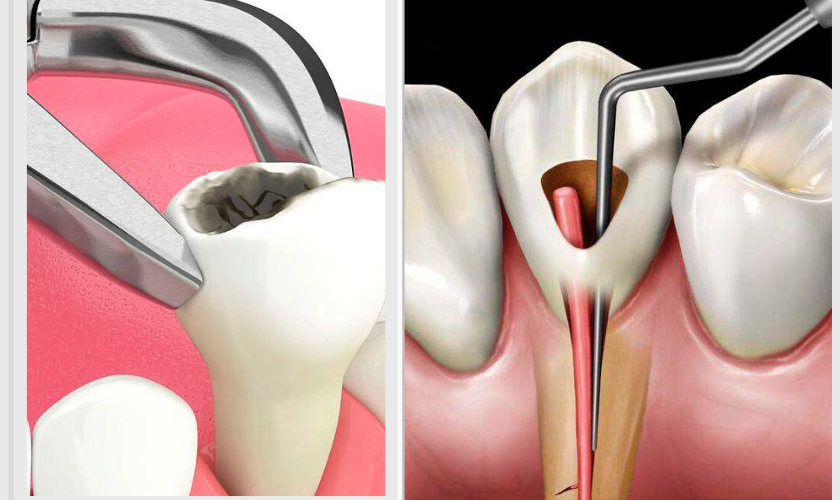
Maintaining good oral health is crucial for overall well-being, and when faced with dental issues such as severe decay or infection, deciding between root canal therapy and tooth extraction can be daunting. Both procedures aim to alleviate pain and restore oral health, but they differ significantly in their approach and outcomes. Understanding the circumstances under which root canal therapy is preferred over tooth extraction is essential for making informed decisions about your dental care.
Understanding Root Canal Therapy and Tooth Extraction
Before delving into when to choose root canal therapy over tooth extraction, it’s essential to grasp the basics of each procedure.
Root canal therapy involves removing infected or damaged pulp from within the tooth, cleaning and disinfecting the root canals, and sealing them to prevent further infection. This procedure aims to preserve the natural tooth structure and function.
On the other hand, tooth extraction involves removing the entire tooth from its socket in the jawbone. While extraction may be necessary in certain situations, it results in the permanent loss of the natural tooth.
Factors to Consider
Several factors influence the decision between root canal therapy and tooth extraction:
Extent of Damage: Root canal therapy is typically recommended when the damage to the tooth is severe but still salvageable. If the tooth can be preserved with root canal treatment, it’s generally preferred over extraction.
Overall Oral Health: The condition of surrounding teeth, gums, and bone structure is crucial. Root canal therapy helps maintain the alignment and integrity of adjacent teeth, preventing shifting and bite problems that may occur with extraction.
Long-Term Outlook: Root canal therapy offers a long-term solution by preserving the natural tooth and its functionality. While tooth extraction may provide immediate relief, it often requires additional procedures such as dental implants or bridges to restore function and aesthetics.
Cost Considerations: While root canal therapy may initially seem more expensive than extraction, it can be a cost-effective option in the long run. The need for additional dental work to replace an extracted tooth can significantly increase overall expenses.
Patient Preferences: Some patients may prefer to preserve their natural teeth whenever possible, while others may prioritize immediate pain relief or convenience.
Signs You Need Root Canal Therapy

There are several scenarios where root canal therapy is typically the preferred choice:
Preserving Natural Teeth: Root canal therapy allows you to keep your natural teeth, which is often desirable for maintaining oral function and aesthetics.
Preventing Further Damage: By removing infected or damaged pulp, root canal therapy prevents the spread of infection and preserves the integrity of the tooth structure.
Maintaining Jawbone Health: Tooth extraction can lead to bone loss in the jaw over time. Preserving the natural tooth with root canal therapy helps maintain the bone structure and stability.
Avoiding Adjacent Tooth Problems: Extraction can disrupt the alignment of adjacent teeth, leading to bite issues and potential misalignment. Root canal therapy helps maintain the natural alignment of teeth and prevents these problems.
Long-Term Success: Root canal therapy has a high success rate, with many treated teeth lasting a lifetime with proper care.
Frequently Asked Questions (FAQs)
Is root canal therapy painful?
Modern techniques and anesthesia make root canal therapy relatively comfortable for patients. Any discomfort experienced during the procedure is typically minimal and manageable.
How long does a root canal procedure take?
The duration of a root canal procedure varies depending on the complexity of the case. It takes one or two visits to the dentist Penn Township for your root canal treatment.
Can I drive home after a root canal?
In most cases, patients can safely drive themselves home after a root canal procedure. However, arrange for transportation after the procedure for your safety.
When faced with the choice between root canal therapy and tooth extraction, it’s essential to consult with a qualified dentist. They can assess your specific situation and recommend the best course of action. By opting for root canal therapy when appropriate, you can preserve your natural teeth. Don’t hesitate to schedule a consultation with your dentist to discuss your options and address any concerns you may have. Your smile deserves the best care possible!
In conclusion, root canal therapy offers numerous benefits over tooth extraction in preserving oral health. When it comes to maintaining the integrity of the natural tooth structure, it’s important to know the right dental procedure. Understanding the factors that influence this decision can help you make informed choices about your dental care and enjoy a healthy, functional smile for years to come.


